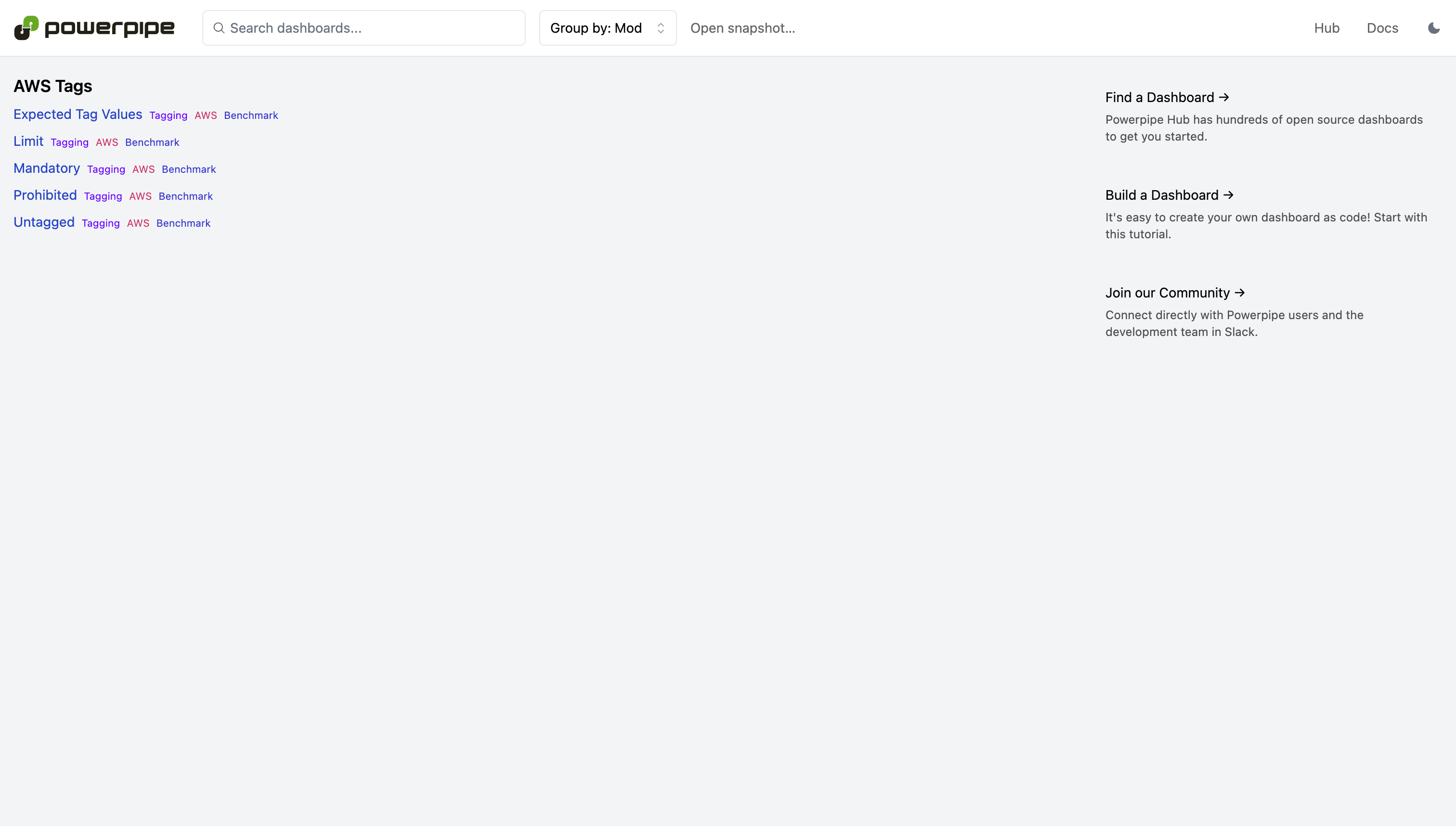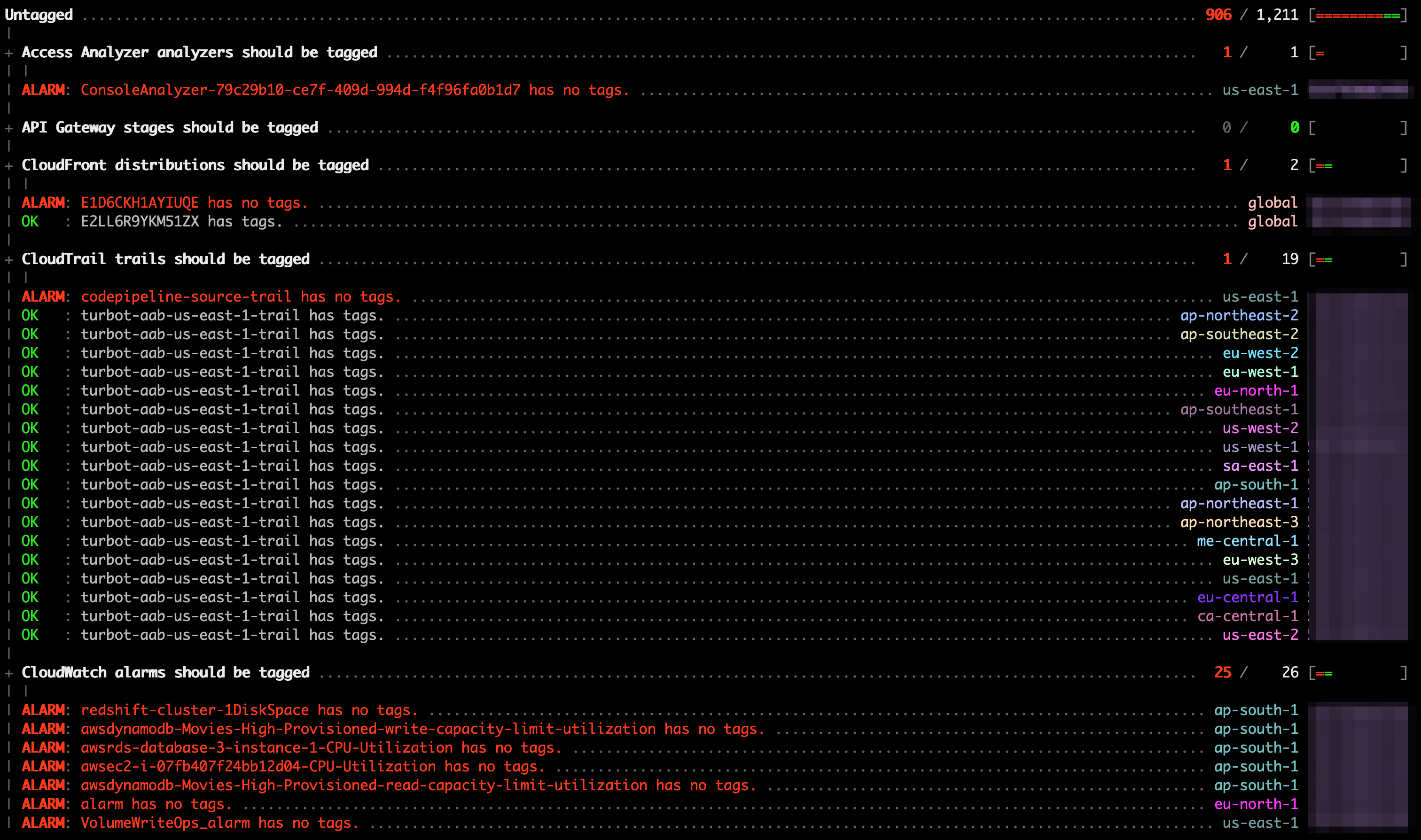An AWS tags checking tool that can be used to look for untagged resources, missing tags, resources with too many tags, and more.
Run checks in a dashboard:
Or in a terminal:
Install Powerpipe (https://powerpipe.io/downloads), or use Brew:
brew install turbot/tap/powerpipeThis mod also requires Steampipe with the AWS plugin as the data source. Install Steampipe (https://steampipe.io/downloads), or use Brew:
brew install turbot/tap/steampipe
steampipe plugin install awsSteampipe will automatically use your default AWS credentials. Optionally, you can setup multiple accounts or customize AWS credentials.
Finally, install the mod:
mkdir dashboards
cd dashboards
powerpipe mod init
powerpipe mod install github.com/turbot/steampipe-mod-aws-tagsStart Steampipe as the data source:
steampipe service startStart the dashboard server:
powerpipe serverBrowse and view your dashboards at http://localhost:9033.
Instead of running benchmarks in a dashboard, you can also run them within your
terminal with the powerpipe benchmark command:
List available benchmarks:
powerpipe benchmark listRun a benchmark:
powerpipe benchmark run aws_tags.benchmark.untaggedDifferent output formats are also available, for more information please see Output Formats.
Several benchmarks have input variables that can be configured to better match your environment and requirements. Each variable has a default defined in its source file, e.g., controls/limit.sp, but these can be overwritten in several ways:
It's easiest to setup your vars file, starting with the sample:
cp powerpipe.ppvars.example powerpipe.ppvars
vi powerpipe.ppvarsAlternatively you can pass variables on the command line:
powerpipe benchmark run aws_tags.benchmark.mandatory --var 'mandatory_tags=["Application", "Environment", "Department", "Owner"]'Or through environment variables:
export PP_VAR_mandatory_tags='["Application", "Environment", "Department", "Owner"]'
powerpipe control run aws_tags.control.ec2_instance_mandatoryThese are only some of the ways you can set variables. For a full list, please see Passing Input Variables.
The benchmark queries use common properties (like account_id, connection_name and region) and tags that are defined in the form of a default list of strings in the variables.sp file. These properties can be overwritten in several ways:
It's easiest to setup your vars file, starting with the sample:
cp powerpipe.ppvars.example powerpipe.ppvars
vi powerpipe.ppvarsAlternatively you can pass variables on the command line:
powerpipe benchmark run aws_tags.benchmark.limit --var 'tag_dimensions=["Environment", "Owner"]'Or through environment variables:
export PP_VAR_common_dimensions='["account_id", "connection_name", "region"]'
export PP_VAR_tag_dimensions='["Environment", "Owner"]'
powerpipe benchmark run aws_tags.benchmark.limitUsing the control output and the AWS CLI, you can remediate various tagging issues.
For instance, with the results of the ec2_instance_mandatory control, you can add missing tags with the AWS CLI:
#!/bin/bash
OLDIFS=$IFS
IFS='#'
INPUT=$(powerpipe control run aws_tags.control.ec2_instance_mandatory --var 'mandatory_tags=["Application"]' --output csv --header=false --separator '#' | grep 'alarm')
[ -z "$INPUT" ] && { echo "No instances in alarm, aborting"; exit 0; }
while read -r group_id title description control_id control_title control_description reason resource status account_id region
do
aws resourcegroupstaggingapi tag-resources --region ${region} --resource-arn-list ${resource} --tags Application=MyApplication
done <<< "$INPUT"
IFS=$OLDIFSTo remove prohibited tags from EC2 instances:
#!/bin/bash
OLDIFS=$IFS
IFS='#'
INPUT=$(powerpipe control run aws_tags.control.ec2_instance_prohibited --var 'prohibited_tags=["Password"]' --output csv --header=false --separator '#' | grep 'alarm')
[ -z "$INPUT" ] && { echo "No instances in alarm, aborting"; exit 0; }
while read -r group_id title description control_id control_title control_description reason resource status account_id region
do
aws resourcegroupstaggingapi untag-resources --region ${region} --resource-arn-list ${resource} --tag-keys Password
done <<< "$INPUT"
IFS=$OLDIFSThis repository is published under the Apache 2.0 license. Please see our code of conduct. We look forward to collaborating with you!
Steampipe and Powerpipe are products produced from this open source software, exclusively by Turbot HQ, Inc. They are distributed under our commercial terms. Others are allowed to make their own distribution of the software, but cannot use any of the Turbot trademarks, cloud services, etc. You can learn more in our Open Source FAQ.
Want to help but don't know where to start? Pick up one of the help wanted issues:

